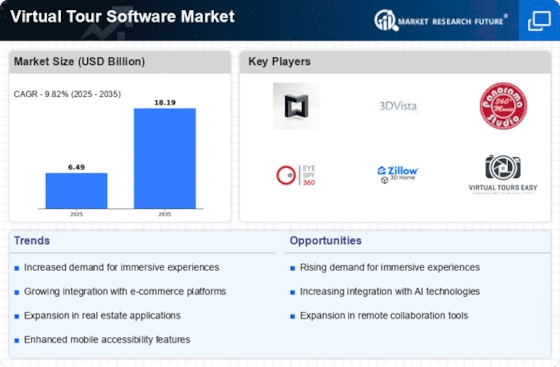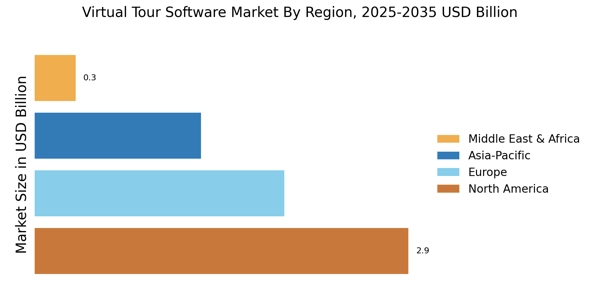Advancements in Technology
Technological advancements play a crucial role in shaping the Virtual Tour Software Market. Innovations in 3D imaging, virtual reality, and artificial intelligence are enhancing the capabilities of virtual tour software. These technologies enable the creation of more realistic and interactive experiences, which are essential for attracting users. For instance, the integration of AI can personalize tours based on user preferences, thereby increasing engagement. The market is expected to benefit from these advancements, as they not only improve user experience but also streamline the development process for creators. As a result, the industry is likely to see a surge in new entrants and innovative solutions.
Shift Towards Sustainable Practices
Sustainability is becoming a focal point in the Virtual Tour Software Market, as businesses seek to reduce their carbon footprint. Virtual tours offer an eco-friendly alternative to traditional travel and in-person visits, aligning with the growing emphasis on sustainable practices. By utilizing virtual tours, companies can minimize travel-related emissions while still providing engaging experiences. This shift is particularly relevant in sectors such as tourism and education, where environmental concerns are increasingly influencing consumer choices. As awareness of sustainability continues to rise, the demand for virtual tour software is expected to increase, reflecting a broader trend towards responsible business practices.
Rising Demand for Remote Experiences
The Virtual Tour Software Market is witnessing a notable increase in demand for remote experiences. As organizations and individuals seek innovative ways to engage audiences, virtual tours provide an immersive solution. This trend is particularly evident in sectors such as real estate, tourism, and education, where virtual tours allow potential clients and students to explore spaces from the comfort of their homes. According to recent data, the virtual tour software market is projected to grow at a compound annual growth rate of approximately 30% over the next five years. This growth is driven by the need for businesses to adapt to changing consumer preferences and the increasing reliance on digital solutions.
Increased Investment in Marketing Strategies
The Virtual Tour Software Market is experiencing a surge in investment as businesses recognize the value of immersive marketing strategies. Companies are increasingly utilizing virtual tours to showcase products and services, thereby enhancing customer engagement. This shift is particularly prominent in sectors such as hospitality and retail, where visual appeal is paramount. Data indicates that businesses employing virtual tours in their marketing strategies report higher conversion rates and customer satisfaction. As organizations allocate more resources to digital marketing, the demand for virtual tour software is expected to rise, further propelling market growth.
Growing Interest in Real Estate Virtual Tours
The real estate sector is significantly contributing to the expansion of the Virtual Tour Software Market. With the increasing need for property visualization, real estate agents and developers are adopting virtual tours to provide potential buyers with comprehensive views of properties. This trend is particularly beneficial in competitive markets, where showcasing properties effectively can lead to quicker sales. Recent statistics suggest that listings with virtual tours receive 87% more views than those without. As the real estate industry continues to embrace technology, the demand for virtual tour software is likely to grow, creating new opportunities for developers and service providers.

















